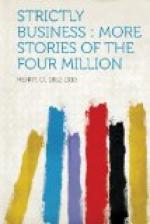Not Fourth Avenue. Not after the tinsel but enlivening glories of the Little Rialto—not after the echoing drum-beats of Union Square. There need be no tears, ladies and gentlemen; ’tis but the suicide of a street. With a shriek and a crash Fourth Avenue dives headlong into the tunnel at Thirty-fourth and is never seen again.
Near the sad scene of the thoroughfare’s dissolution stood the modest restaurant of Quigg. It stands there yet if you care to view its crumbling red-brick front, its show window heaped with oranges, tomatoes, layer cakes, pies, canned asparagus—its papier-mache lobster and two Maltese kittens asleep on a bunch of lettuce—if you care to sit at one of the little tables upon whose cloth has been traced in the yellowest of coffee stains the trail of the Japanese advance—to sit there with one eye on your umbrella and the other upon the bogus bottle from which you drop the counterfeit sauce foisted upon us by the cursed charlatan who assumes to be our dear old lord and friend, the “Nobleman in India.”
Quigg’s title came through his mother. One of her ancestors was a Margravine of Saxony. His father was a Tammany brave. On account of the dilution of his heredity he found that he could neither become a reigning potentate nor get a job in the City Hall. So he opened a restaurant. He was a man full of thought and reading. The business gave him a living, though he gave it little attention. One side of his house bequeathed to him a poetic and romantic adventure. The other gave him the restless spirit that made him seek adventure. By day he was Quigg, the restaurateur. By night he was the Margrave—the Caliph—the Prince of Bohemia—going about the city in search of the odd, the mysterious, the inexplicable, the recondite.
One night at 9, at which hour the restaurant closed, Quigg set forth upon his quest. There was a mingling of the foreign, the military and the artistic in his appearance as he buttoned his coat high up under his short-trimmed brown and gray beard and turned westward toward the more central life conduits of the city. In his pocket he had stored an assortment of cards, written upon, without which he never stirred out of doors. Each of those cards was good at his own restaurant for its face value. Some called simply for a bowl of soup or sandwiches and coffee; others entitled their bearer to one, two, three or more days of full meals; a few were for single regular meals; a very few were, in effect, meal tickets good for a week.
Of riches and power Margrave Quigg had none; but he had a Caliph’s heart—it may be forgiven him if his head fell short of the measure of Harun Al Rashid’s. Perhaps some of the gold pieces in Bagdad had put less warmth and hope into the complainants among the bazaars than had Quigg’s beef stew among the fishermen and one-eyed calenders of Manhattan.




